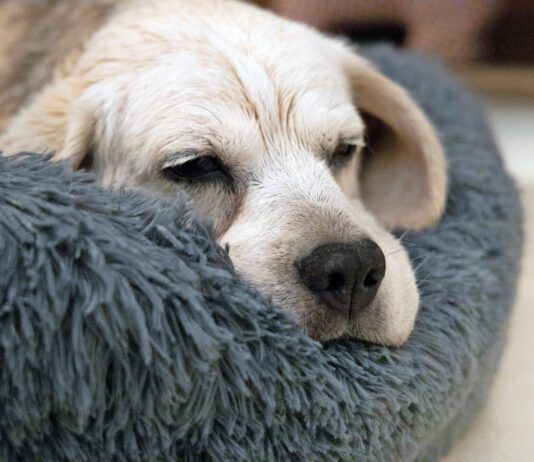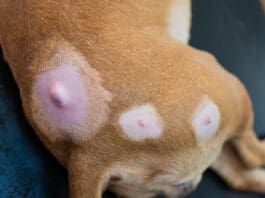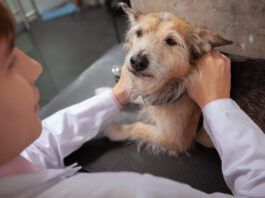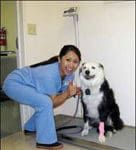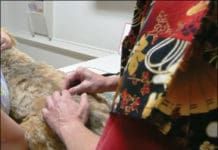New Hope for Treating Osteosarcoma On the Horizon
Many dogs do just fine after amputation necessitated by osteosarcoma. A new vaccine may help them continue to enjoy life even longer.
Best Treatment Options for Canine Lipomas
Uh-oh. What’s this lump? Any growth on your dog’s body deserves attention, especially one that wasn’t there last time you checked. It could be a sebaceous cyst (a sac filled with sebum, a cheesy or oily material, caused by clogged oil glands in the skin), an abscess (a pus-filled swelling caused by infection), or – everyone’s worst nightmare – a cancerous tumor. But in most cases, the lumps we discover as we pet and groom our dogs are lipomas, which are benign (non-cancerous) fat deposits, also known as fatty tumors. An estimated 1.7 million dogs are treated in the United States for lipomas every year, and according to one survey, American veterinarians average 25 lipoma removals annually at a cost to owners of $635 million. Lipomas tend to emerge as dogs reach middle age and increase in number as dogs get older. A dog with one lipoma is likely to get more. Lipomas are most often found on the chest, abdomen, legs, or armpits (axillae). These fatty lumps aren’t painful and they usually stay in one place without invading surrounding tissue.
Studies Have Linked Lawn Pesticides with Canine Malignant Lymphoma
It's a ton of fun to see an athletic, healthy dog sprinting across a sprawling lawn of thick green grass but could this practice be dangerous to the dog's health? A study presented in the January 2012 issue of the journal Environmental Research concluded that exposure to professionally applied lawn pesticides was associated with a significantly (70 percent) higher risk of canine malignant lymphoma (CML). It's a broad conclusion and light on specifics. The case-control study, conducted between January 2000 and December 2006 at the Foster Hospital for Small Animals at Tufts University's Cummings School of Veterinary Medicine, was structured around a 10-page questionnaire that was mailed to dog owners who were having their pets treated at the Foster Hospital; the resulting data came from the owners of 266 dogs with confirmed cases of CML and 478 dogs in two control groups (non-CML cases).
Chemotherapy for Dogs: What to Expect
Cancer. My heart dropped to my stomach. In February 2010 my Border Collie Daisy became one of an estimated six million dogs diagnosed with cancer each year. Chemotherapy. My stomach tumbled to my feet. The diagnosis was scary enough; how could I possibly consider chemotherapy? I had visions of a treatment worse than the disease itself. As it turns out, my preconceptions of chemotherapy were far worse than its reality. Chemo hasn't cured my dog more on that later but it's given us more than 18 months (and counting) of joyful, quality time together.
Daisy’s Chemotherapy Day
We arrive at the veterinary clinic at 7:45 AM. Daisy leaps out of the car and heads for the grass in front of the door; after a long squat, she makes a beeline for the entrance, pulling me behind her. It's always at this point I watch carefully to see if I can observe any signs of distress or apprehension about this almost weekly visit.Instead, she is excited about going in to seeing her buddies; if I were a betting person, I would put money on the notion that she enjoys these outings.
Bone Marrow Transplants Offer a Promising Treatment for Canine Lymphoma
Exciting news regarding bone marrow transplants for dogs with lymphoma has recently emerged. North Carolina State University’s College of Veterinary Medicine in Raleigh is the first university in the world to open a canine clinical bone marrow transplant (BMT) unit. Dr. Steven Suter, assistant professor of veterinary oncology at NCSU, is about to perform his 30th transplant, all done over the past two years. Lymphoma, also called lymphosarcoma, is one of the most common cancers to occur in dogs. While it used to be considered a disease of middle-aged and older dogs, those demographics have changed in the past 5 to 10 years, with more and more young dogs being diagnosed. Golden Retrievers have a particularly high risk for this type of cancer.
Acupuncture For Dogs With Cancer
without any hesitation
Canine Lipomas
Lumps, bumps, fatty tumors – call them what you will, but nobody likes to see her dog develop lipomas, those persistent little foothills that can sprout up on older dogs – and sometimes, not so-old ones. Often soft and squishy to the touch, benign fatty tumors are not a threat to your dog’s health. (The exception is infiltrative lipomas, which can invade muscle tissue, but these are relatively rare.) While lipomas can be unsightly, many vets opt not to remove them unless they are in a location where their growth impedes a dog’s mobility. But many holistic veterinarians see lipomas as far from innocuous. Instead, they stress, lipomas are symptoms of a bigger problem.
Canine Cancer Therapy Update
Despite everything modern medicine has to offer, cancer in dogs remains among the most feared of canine diseases. Just over a year ago, Whole Dog Journal reviewed conventional, complementary, and alternative cancer therapies in a series of articles. Since then, a cancer vaccine has been approved for veterinary use and a new version of an old herbal salve has become a “first choice” for many holistic veterinarians.
Is Cancer Prevention for Dogs Possible?
What could be better than curing your dog's cancer? That's easy! How about avoiding the illness in the first place? No one has done any clinical trials or statistical studies that prove you can prevent cancer in at-risk dogs. But common sense and clinical experience make a strong case for avoiding anything that exposes an animal to known carcinogens or weakens the immune system
What Are the Alternatives for Treating Cancer in Dogs?
The high-tech world of modern medicine has so many weapons that its “war on cancer” arsenal promises something for everyone. But all along, there have been patients, physicians, veterinarians, and animal caregivers who refuse chemotherapy, radiation treatments, surgery, prescription drugs, and other oncology protocols.
Don’t Despair; Just Care
Holistic care and home support are effective for treating canine cancer.


